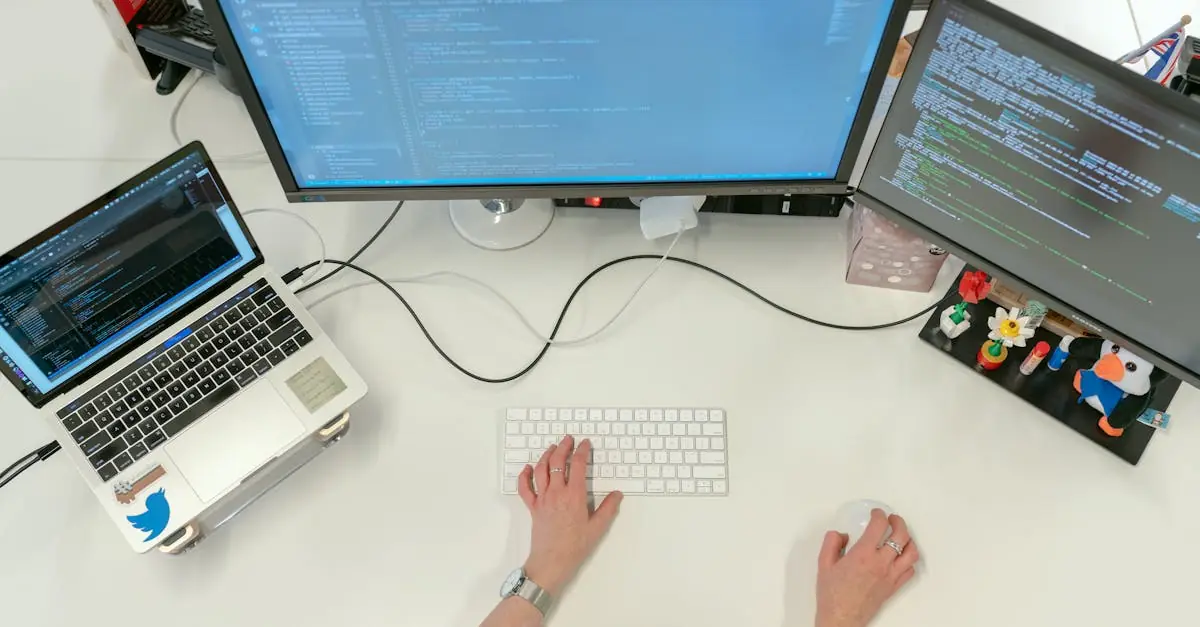Table of Contents
ToggleIn the fast-paced world of tech, software engineers are the superheroes without capes. They wield keyboards instead of swords and tackle bugs with the precision of a ninja. But what does it truly take to thrive in this digital battleground? Understanding the essentials is key to turning a novice into a coding warrior.
Understanding Software Engineer Essentials
Software engineers require a solid foundation of key skills and problem-solving abilities to excel in their roles. Gaining proficiency in these areas enhances their effectiveness in tackling complex challenges.
Key Skills Required
Programming languages such as Python, Java, and JavaScript form the backbone of software development. Familiarity with version control systems like Git is essential for collaborative projects. Knowledge of data structures and algorithms helps engineers optimize code efficiency. Additionally, understanding web development frameworks enables the creation of user-friendly applications. Knowledge of database management systems, including SQL and NoSQL, supports efficient data handling. Communication skills facilitate teamwork and project management. Adaptability to new technologies remains crucial as the tech landscape continuously evolves.
Importance of Problem-Solving
Problem-solving plays a pivotal role in software engineering. Engineers often face complex issues that require innovative solutions. Rapid identification of problems streamlines the troubleshooting process. Approaching challenges with analytical thinking leads to effective and efficient designs. Engineers utilize algorithms to devise solutions, making logical reasoning indispensable. Practicing problem-solving techniques strengthens critical thinking skills. Continuous learning through challenges inspires creativity and resilience, which benefits career growth. Ultimately, strong problem-solving capabilities separate successful engineers from their peers.
Programming Languages to Master
Mastering programming languages forms a core component of a software engineer’s skill set. Proficiency in these languages enables engineers to develop efficient, scalable applications.
Popular Languages in Demand
Python leads the pack as a versatile language favored for data science, machine learning, and web development. Java remains crucial for building large-scale enterprise applications. JavaScript plays a key role in front-end development, enhancing user experiences on websites. C# is widely adopted for game development, particularly using the Unity engine. According to the TIOBE Index, these languages consistently rank among the top choices for software engineers.
Choosing the Right Language for Projects
Selecting the appropriate programming language depends on the project requirements. For quick development and data analysis, Python often stands out as the best option. Java excels in scenarios that require robust performance and large-scale system integration. When building interactive web applications, JavaScript provides essential functionality. Each language offers unique strengths; understanding these attributes helps engineers make informed choices for their specific needs.
Development Tools and Technologies
Understanding essential development tools and technologies is crucial for software engineers. These tools enhance coding efficiency and streamline collaboration.
Integrated Development Environments (IDEs)
IDEs play a significant role in the software development process. With features like code editing, debugging, and automation, they provide a comprehensive environment for developers. Popular IDEs such as Visual Studio, IntelliJ IDEA, and PyCharm support multiple programming languages and frameworks. Each environment offers unique capabilities tailored to specific tasks, aiding developers in managing large codebases. Choosing the right IDE improves productivity and allows for better code organization, making it easier to focus on writing quality software.
Version Control Systems
Version control systems (VCS) are essential for managing changes in code. Git stands out as the most widely used VCS, enabling developers to collaborate effectively. It allows for tracking changes, branching, and merging, which simplifies workflows in team projects. Alternative systems like Mercurial and Subversion also offer valuable features. Adopting a VCS helps maintain code integrity and prevents data loss, ensuring teams can revert to previous versions if necessary. Understanding these systems creates a solid foundation for collaborative software development.
Best Practices for Software Development
Following best practices enhances software quality. These practices streamline development processes and ensure maintainability.
Writing Clean Code
Writing clean code increases readability and reduces errors. Organizing code logically aids in understanding. Use meaningful variable names to convey intent. Consistent formatting, such as proper indentation and spacing, simplifies navigation. Commenting on complex sections clarifies purpose without cluttering the code. Engineers should embrace coding standards within teams to maintain uniformity. Refactoring code periodically improves structure and performance. Adopting principles like DRY (Don’t Repeat Yourself) ensures efficiency. Clear, documented code eases the onboarding of new team members.
Effective Testing Strategies
Effective testing strategies prevent bugs in production. Employ unit testing to validate individual components early. Integration testing checks how components work together, revealing issues before deployment. Automated testing tools speed up the process, enabling rapid feedback. Code coverage metrics help identify untested paths and ensure comprehensiveness. Performance testing evaluates application responsiveness under load. Stress testing reveals how systems handle extreme conditions. Continuous integration (CI) practices automate testing, reducing deployment risks and ensuring quality. Following these strategies leads to robust, reliable software.
Mastering the essentials of software engineering is crucial for anyone looking to thrive in this dynamic field. With a solid grasp of programming languages and development tools engineers can tackle complex challenges effectively. Emphasizing problem-solving skills and adopting best practices ensures the creation of high-quality software.
As technology continues to evolve staying adaptable and open to learning will set successful engineers apart. By honing these skills and embracing continuous improvement individuals can not only enhance their career prospects but also contribute meaningfully to the tech industry.




